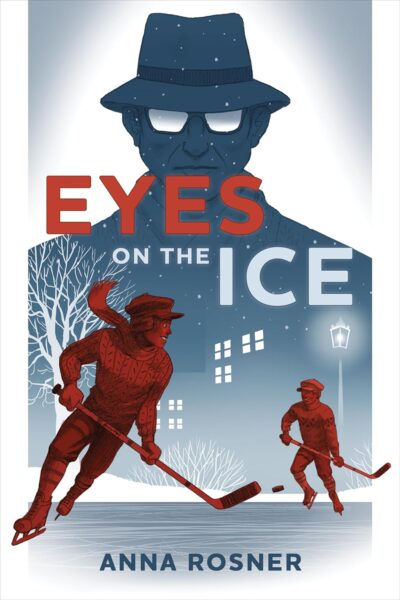Mixing passion for a sport and a chance for readers to gain historical perspective truly works in this novel. Set in 10-year-old Lukas’s first-person point of view, we establish early on that although poor, the family is loving and happy. Also, that Lukas and his two brothers (12 and 6) love nothing more than playing hockey. Until politics interfere.
The writing is captivating and puts you right in the scenes:
Outside, the temperature is dropping with the sun, and the wind quickly reddens Alexander’s cheeks… We follow my mother like ducks in a row through the narrow streets to the market square, where the line for fruit and vegetables stretches halfway down the block… We collapse onto a snowy bench in the park, our hair half sticking to our foreheads and half turning to ice.
The narrative also strongly and quickly establishes the family’s poverty and love of hockey. For instance, they have no gloves, helmets or padding:
Kids like us with no money just skate in sweaters and stuff our pant legs into thick socks.
Denys has outlined a life-sized net with tape and string on the [living room] wall. We take slapshots with brooms and a bunched-up rag that keeps unraveling.
But nothing can dim their enthusiasm:
I pull off my skates and wipe the ice from the blades. Every time my skates leave my feet, all I can think about is when I’ll be able to put them back on again.
Action scenes are sure to satisfy young hockey fans:
When I begin to shoot on the net, I know I will not miss. All those nights of shooting at the living room wall and between two shoes are paying off.
I block the goalie’s sightline with my body. You can’t stop what you can’t see. The goalie slides to the right to look around me, while Denys flies to the left, taking a few long strides to dodge a defenseman. I hold my breath. Denys lifts his stick high for the slapshot, almost to his shoulders, and launches the puck into the back of the net just as the final buzzer sounds.
Readers are introduced to historical elements without it ever feeling forced:
Once a week, my brothers and I go to Young Pioneers after school, which my father criticizes under his breath when he thinks we’re not listening. Soviet propaganda, he mutters. Spare me… If we’re not good Pioneers, we won’t find jobs later on.
Then there’s confusion and despair when their father is arrested and they’re briefly robbed of hockey – until hockey becomes conditional and a moral dilemma.
I can barely remember life before my father’s arrest. I can barely remember what it is to be happy… Don’t think, I tell myself. Don’t think, just survive.
History, politics and the tug-of-war of a stark decision that must be made. That’s a heavy load for middle-graders, but completely worthy of embracing. The outstanding climax oozes jaw-clenching tension – and is modelled on a real-life escape. Unfortunately, the aftermath of their dynamic escape feels rushed, like the story is too eager to end.
Never mind, because it’s satisfying anyway, and readers will both enjoy and learn. Bravo to the author.
– Pam Withers


